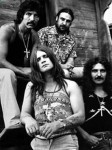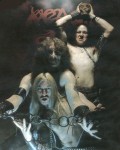METAL MONDAY: GRUNTING AND GROWLING, THE CURRENT STATE OF METAL VOCALS
posted in: Rock

With each passing year metal subgenres develop their own unique style, most noticeable through vocal differences. Growls, grunts, screams, yells, moans, groans ” you name it. While most metal genre tap their lung power, each put their own spin on vocals to develop a trademark primal scream.

Black Sabbath sporting some pretty rad mustaches
Metal pioneers like Blue Cheer and Black Sabbath are purveyors of the moaning/wailing vocal style. The best example of this vocal style in its early stages is the song “N.I.B.” from Black Sabbath’s self-titled debut release, where the catch of the song is Ozzy’s “OH YEAH” at the end of the main riff in the song. Moaning and wailing is also prevalent among many Doom and Sludge metal bands such as Type O Negative and Candlemass (the best modern example being Candlemass‘s song “Samarithan” (that Messiah Marcolin is one creepy dude). Power metal and the new wave of British heavy metal used a similar approach, albeit with more power (see: Rob Halford and Bruce Dickinson)
Taking cues from punk bands and the new wave of British heavy metal, thrash metal emerged on the scene with its extreme screaming, yelling, and shouting. The quintessential thrash metal vocal style can be heard in any of the early Slayer and Metallica records. This change in vocal style is almost exclusively responsible for all non-clean metal vocals styles to come. Trash metal really cultivated the “pissed off” sound the genre is known for (particulary in songs about social issues sung in the vein of their punk predecessors).

Pioneers of Black Metal, Venom
A direct offshoot of thrash metal, black metal (you know, those evil satanists with the funny face paint and freaky clothes) emerged with a dry, raspy vocal style. The pioneering black metal band, Venom (followed soon by Bathory, Hellhammer, and Celtic Frost), were the first to the raspy sound that became synonymous with black metal (most obvious with their album and song “Black Metal”). These gruff black metal vocals eventually evolved, became less raspy and spilled over into what we know as death metal growls. Death metal growls are, more or less, mid tone screaming (something akin to heavier Slayer vocals). Then, in the early 1990s, the inception of “brutal death metal” and the guttural “cookie monster” vocals became the mainstay for death metal (the obvious example here is Cannibal Corpse, being the most well known brutal death metal band in the history of bands).

Alex Erian of Despised Icon squealin' like a pig (maybe)
The pig squeal, a technique in which the vocal “bree bree” mimick the sounds of a dying pig, is another extreme vocal styles from the 80s that was used by underground brutal death and grindcore bands. This technique only recently became popular with the rise of the deathcore genre and bands such as Despised Icon and Job For A Cowboy who used pig squeals on their early releases but have since migrated away from th technique.
Since the major vocal style developments of 80s and 90s, only a few other genres have built upon the styles from previous subgenres. Melodic death metal of the early to mid 90s featured the standard death metal growl, but varied the range in terms of the vocal register. Metalcore, the less intense cousin of deathcore, normally employs both clean, melodic vocals and a range of screaming but primarily features the mid-to-high register.

Melissa Cross, pro screamer (literally)
While vocal style are possibly the most key element in identifying what style of metal you are listening to, vocal technique is what ensures a singer’s ability to shriek, howl or groan for years to come. Though few will believe it, there is proper technique to screaming and growling that prevents vocal chords from being torn to shreds (protecting your voice may not sound very “metal” but being able to perform night after night is pretty important). Melissa Cross can fill you in on all of that, considering that she (and not me) is the expert.
Over the last decade, extreme of metal vocals have become less and less intelligible. Supposed lyrics give way to an abundance of indecipherable pig squeals (as in Despised Icon’s early music). On The Black Dahlia Murder‘s latest DVD, Majesty, band members jokingly discuss the future of metal vocals, and mention that it would eventually revert to “people making fart noises with their mouths” “ I, for one, would laugh hysterically if this prediction came true but, for metal’s sake, let’s hope that it doesn’t.
Now that you know all about different vocal styles, put yourself to the test. Try to figure out what styles are used in these rad OurStage metal songs (hint, some use fusion styles):
